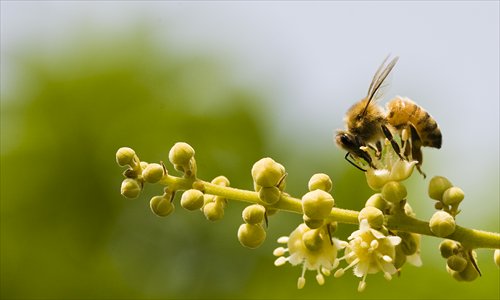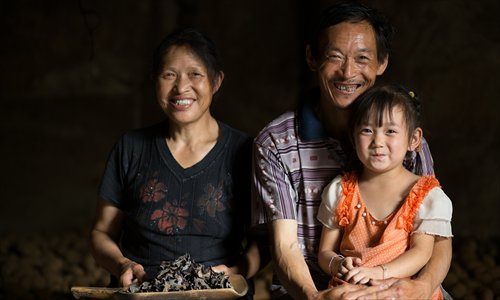Farmers’ market goes online

Honey is just one of the products locals in Shangzhuang village, Changping district, are selling to Taobao buyers since they launched their store last year on the online retail platform. Photo: Li Hao/GT
Liu Chengfu doesn't know much about the Internet, but it has allowed the 49-year-old beekeeper to sell honey to more customers than he ever imagined. For nearly a decade, Liu has tended to his hives in Shangzhuang, a sleepy village of 1,300 people located 60 kilometers northwest of downtown Beijing in Changping district.
Previously, most of Liu's customers were urbanities visiting his farm on leisurely weekend trips. But since Liu and his fellow villagers embraced the world of e-business last year, they have attracted customers from all over the country.
Shangzhuang graduate village official Xie Guodong, 27, has helped Liu and other farmers in the village make the transition. A postgraduate agricultural and forestry economy management major at Beijing Forestry University, Xie was motivated to step in after seeing locals struggle to sell their produce the only way they knew: face to face.
Xie and fellow graduate village official Ma Jinlong, a 26-year-old studying at Beijing Information Science and Technology University, have set up a store on Taobao, China's largest online retail platform, selling villagers' produce.
They receive orders online from urban customers who are happy to pay a higher price for fresh, additive-free food that they believe offers a safer alternative to big-brand rivals.







Distrust among urban shoppers over food safety has delivered an e-business boom for Internet-savvy rural vendors. Photos: Courtesy of Ba Wenhan, Xu Zheng, Li Hao/GT
Creating a buzz
Following the peak of their reproduction cycle in March, Liu's bees gather nectar from peach blossoms and other flowers in bloom from mid-April.
"My honey naturally matures. It contains jujube and chaste, retaining its fresh taste from the hive," said Liu, gesturing to his row of hives near a grazing donkey.
Every year, representatives of major honey brands visit Changping to purchase honey and other bee products from villagers. In the past, this was the only way for Liu to tap the mainstream market. But he now reaches distant urban consumers using Taobao, which has also boosted his profit margin.
Unlike honey sold at supermarkets, Liu said his honey is richer because it doesn't contain additives or ingredients that attenuate the honey's density.
In July 2013, Xie and Ma opened the Beijing Graduate Village Officials Honey Shop to sell honey from six beekeepers in Shangzhuang village, Huaguoshan and Duijiuyu. They also set up accounts linked to their Taobao store on microblogging service Sina Weibo and online messaging service WeChat.
In addition to honey, Xie and Ma also sell other local produce, including Chinese chestnuts and walnuts. After receiving orders online, the duo packages food kept in a storeroom and arranges their express delivery to customers.
"There was no express postal service in the village before we launched our e-business. The postman takes our orders for delivery two or three times every week," said Ma, who handles orders. Ma and Xie earn between 5 yuan and 10 yuan ($0.80-$1.60) per order.
In March, 67 jars of Shangzhuang village chaste honey priced at 55 yuan per kilogram were sold on Taobao. In addition to Taobao sales to individual customers, honey was sold to companies taking advantage group-purchase promotions and at fairs at Beijing universities.
Xie and Ma aren't alone in introducing Chinese farmers to Taobao, with dozens of similar ones administered by graduate village officials using the online retail giant nationwide. An August 2013 report by online giant the Alibaba Group found China has 1.6 million stores on Taobao and business-to-consumer rival Tmall registered to nearly 600,000 rural IP addresses.
Assisted by urban youths sharing their technological knowledge in rural areas, farmers' livelihoods have climbed in step with their growing profits.
"In the past, the average farmer in Changping district earned an annual income of around 8,000 yuan. But the use of e-business and other commercial platforms has boosted their annual earnings by up to 12,000 yuan," said Xie.

A family from Qingchuan county, Sichuan Province, who Ba Wenhan buys wild edible fungus from to sell on Taobao. Photo: Courtesy of Ba Wenhan
A bite of entrepreneurialism
Ba Wenhan, 29, runs a Taobao store selling specialty foods from Southwest China's Sichuan Province. His business boomed in 2012 after China Central Television aired its hit documentary series A Bite of China, which explored the country's regional cuisines and featured moving stories about the role of food in people's lives.
Four years ago, Ba quit his stressful office job in Shenzhen, Guangdong Province. Inspired by TV cooking shows and articles written by Singaporean food critic Chua Lam, he decided to move to Sichuan's capital Chengdu and set up an online store selling local foods.
Ba, originally from Northwest China's Gansu Province, often reads about the history of different Sichuan regions and spends days traveling to remote areas in search of certain foods. In March, Ba visited Pingwu county in the Sichuan city of Mianyang seeking a type of mushroom famed for growing inside logs.
His research led him to village where the mushroom flourished, but Ba was disappointed to learn the mushrooms were being produced commercially rather than picked in the woods.
"Compared with mushrooms grown in greenhouses, mushrooms grown in the wild are much more delicious. Nowadays, the latter way has been abandoned because it takes a long time for the mushrooms to mature," he said. "Many of the foods I cherished in childhood have disappeared."
In his store, the most popular products are dried beef from Luocheng township, green pepper from Hanyuan county, dried wild bamboo from Wawu Mountain and spicy bean paste from Pixian county.
Ba travels to different regions from Chengdu to source foods he can sell. He employs five people in his storeroom and sells around 1,000 packages of dried beef each month.
Reeling in customers
Another unique selling point for online food vendors is the personal touch they provide in packaging. Hailing from Guangzhou, Guangdong Province, Xu Zheng runs a Taobao store named Yiweichan, or "a taste of Zen." The 39-year-old sells seafood from Zhapo, a scenic harbor off Hailing Island where his girlfriend grew up.
His products include abalone, fish maw and shrimp, all of which Xu collects from fishermen in Zhapo.
"Our relatives and friends living by the sea help us select the best seafood," said Xu, who launched the store in 2013.
Business was poor when Xu launched his store in 2013, with some months only resulting in an order or two. But business turned toward the end of his first year, when Xu enlisted the services of a friend from an advertising agency to give the company a simple yet nostalgic logo featuring a traditional fisherwoman.
Xu's packaging features calligraphy handwritten by his father for his foods to give his products a "simple, natural touch," he said. He currently receives around seven or eight orders daily, with no immediate plans to expand his business.
"We spend a lot time packaging and dispatching orders. Our focus is on carefully selecting seafood products of high quality," he said.
Providing peace of mind
While many big food brands claim to have safe production standards and strict quality control, food safety is an ongoing concern to Chinese consumers.
On Taobao, there is no guarantee of products' quality or supervision by a regulatory body.
The best indication customers have is feedback and ratings provided by Taobao users, but experts say the principle of buyer beware is appropriate.
"Positive consumer feedback doesn't guarantee food quality. Sellers have no obligation to provide evidence that supports their products' description," said Fan Zhihong, a nutritionist and food safety expert at China Agriculture University.
While food sold at supermarkets must undergo strict testing before it makes it on to shelves, there is no such scrutiny of food sold online, said Fan.
"Everyone likes the idea of natural, addictive-free food, but there is no international or domestic standards that determine what can be labeled as 'natural' or 'pure,'" she said.
In the interests of food safety, Ba said he only collects dried food that has a long shelf life.
"It is a contradiction. On one hand, some of the most flavorful, natural foods can't be sold because vendors don't have a license. On the other hand, additives and preservatives are common in many of the foods considered safe," said Ba.
Ma recognizes that proving food from Shangzhuang village is safe is vital to build consumer confidence and grow their fledgling Taobao business.
"The village is planning to establish a rural cooperative that can manage the business. We are also planning to work with China Agriculture University to build a food quality checking system," said Ma.